- Home
- Suzanne Selfors
Mad Love Page 3
Mad Love Read online
Page 3
“Yeah, you’re right.” He slid his glasses up his nose. “We just moved here. I’d remember if we’d met.”
I tapped my flip-flops. He stared at me. I stared at him. The melody of the Peruvian flute skipped up my back and made me shiver.
“So,” we said at the same time.
“Ladies first,” he said.
“So, you just moved here?”
“Yeah. From Los Angeles. My dad owns this shop. He took a part-time job lecturing at the university. He teaches mythology. How ’bout you? You live around here?”
“Yeah.”
“What’s the high school like? I think I’ll be going to Roosevelt.”
Another lie rose in my throat and curdled on my tongue. “Roosevelt’s okay. Normal, I guess. That’s where I go.” I didn’t know anything about Roosevelt High. Since sixth grade, I’d attended Welmer Girls Academy, a prestigious boarding school in British Columbia, Canada, a three-hour drive from home. My life had been plaid skirts, choir practice, newspaper committee, and monthly dances with the Welmer Boys Academy. Being away at school had made things easier for both me and my mother. But everything was different now. Now I took classes online.
“I’ll be a senior in the fall,” he said.
“I’ll be a junior.”
A customer entered the antiquities shop. I didn’t know what else to say. If I wasn’t going to buy something, there was no other reason to hang around. “Well, I’d better get going.”
“Yeah. You should probably get that fish into a refrigerator.”
“Right.”
“Hey.” He slid off his stool. “I was wondering …” He glanced at the customer who was picking through some Japanese fans. Then he took a long breath, as if readying himself for a flu shot, and stepped around the counter. “I don’t really know anyone around here. You want to go to a movie? Tonight?”
I froze. Yes, I wanted to say. Definitely. We’d sit side by side, sharing popcorn. Maybe he’d whisper in my ear. Maybe he’d put his arm around my shoulder. A walk home flashed before my eyes, another date, and then the inevitable questions. “Why can’t I see your apartment?” “Where is your mother?” “Why haven’t you been showing up at school?”
“I’m sorry. I’d like to but … it’s complicated.”
“Okay.” He nodded, then returned to his stool. He didn’t look at me. His cheeks turned a bit red.
That was it. With a single sentence I’d broken the spell. The serenading flute lost its charm. The fantasy was over. This had been my chance and I’d panicked and turned him down. The flute whined above my head as I grabbed the shopping bag and hurried toward the door. The cute guy with the freckles seemed miles away as I stepped back into the real world.
How do you make clam juice anyway? Do you dump the clams into a barrel and stomp on them with bare feet? Do you stick a spigot into their necks and drain out the juice? Or do you squeeze the life out of the little bivalves one at a time? And why would anyone drink a can of the stuff?
And how do you go on a date when you’re scared to let anyone into your life? How do you smile and keep up the small talk and pretend that everything’s okay? If you start a relationship pretending to be someone you’re not, when can you stop pretending?
I wondered about all these things as I climbed the apartment’s front steps and found Reverend William Ruttles blocking the doorway with his six-foot-six-inch frame. A canvas bag sat at his feet. “Hello, Alice,” he said in his resounding preacher’s voice. “How are you?”
“Fine.” I unclenched my aching fingers. I’d stopped at the post office box on the way home so the shopping bag was heavy with bills and junk mail.
The reverend leaned on his cane, his knees weakened by his bulk. He lowered his voice, for secrecy thrives in hushed tones. “Are you going to visit your mother tomorrow?”
“Yes. Are you coming with us?”
“I’m afraid I’ll have to miss this visit. I have a doctor’s appointment.” Reverend Ruttles was a member of my mother’s inner circle so he knew the truth. Well, some of the truth. He lived in the first-floor apartment across from ours. The four-unit building had been one of my mother’s many purchases in the days when she’d churned out books. But after a bunch of bad financial decisions, she’d been forced to sell the lake house. We’d moved into the apartment when I was five. The reverend and Mrs. Bobot had come with the place—built-in tenants who’d turned into trusted friends.
“Any word?” Reverend Ruttles asked. “Is she feeling better?”
“She’s the same.” I wanted to change the subject as much as I wanted to get out of the heat. “Where are you going?”
“I’m off to meet with the social committee. You’re looking at the newly elected chairperson.” Though retired from the pulpit, the reverend still volunteered at his Episcopal church. “We’ve got important matters to discuss, like coffee filters and diabetic cookies. There was a big hullabaloo last week about the price of doilies.”
I carried his canvas bag down the front steps as he began his slow descent. “She will get better, Alice. You must have faith. Your mother is strong and nothing can keep her from you.”
With all my heart I wanted to believe that.
At the bottom step, he took the canvas bag. “Thank you, my dear.” He tapped the sidewalk with his cane and said, “Praise the Lord, what a glorious day.” Then he hobbled off to the bus stop.
I hesitated before opening my apartment door, knowing the familiar ache that waited for me. Loneliness had moved into my apartment as if it had no better place to go. It rubbed up against me like a hungry cat when I stepped inside. Once the click of the door faded, silence filled the rooms. So much was missing—the smell of my mother’s perfume, the sound of her tapping fingers as she wrote, the simple questions like, “How was your day?” Or “Do I look fat in this?” During my Welmer Girls Academy years I’d become used to the short separations between holidays and long weekends, but I’d never faced an entire summer on my own.
I kicked off the flip-flops, dropped my purse, then sorted through the mail. Catalogs, junk, a few bills, and a single fan letter. Why read it? It would be just like the others.
When can I buy your next book?
When will your next book be out?
I’m so looking forward to your next book.
Truth was, the letters used to come by the dozens. Now only a few arrived each week as hungry romance readers drifted to other authors. Romance readers are a unique group. They consume books by the armful and are fiercely loyal to their favorite authors. But even the most loyal reader can’t be loyal if there’s nothing to read. If my mother didn’t write another book soon, a new writer would replace her on the bestseller list and Belinda Amorous would probably go out of print and her stories would drift into oblivion.
I pulled the manila envelope from the shopping bag and tossed it onto the kitchen table. One letter remained, from Heartstrings Publishers, my mother’s publisher. Nothing good came from Heartstrings these days. They’d sent a series of letters and e-mails asking my mother when she’d finish her next manuscript. Because my mother wasn’t around to answer, I’d pretended to be her and had replied, “I’m working on it.” But she wasn’t working on it.
Belinda Amorous was an inpatient at Harmony Hospital, an exclusive mental health facility.
When I was thirteen, after she’d emerged from a long depression, she sat me down at the kitchen table. “I went to the lawyer and had my will changed,” she told me. “Mrs. Bobot is listed as your legal guardian if anything happens to me.”
“Like what?” I asked.
“In case I ever get so sick that I can’t take care of you. Do you understand?”
I didn’t want to understand. “But that will never happen,” I said.
But it did happen. Just over four months ago, I came home for a weekend visit and found her sitting in the corner of the bathroom, staring at the wall. She wouldn’t move, not even to use the toilet. She sat there all day. He
r doctor said she was in a sort of stupor and that she needed to go to Harmony Hospital, where her identity would be protected. “She can’t go in an ambulance,” Mrs. Bobot insisted. “It will cause too much of a scene.” So Mrs. Bobot agreed to drive her. Just before they left, my mother managed to say a few words to me.
“No one can know. Don’t tell anyone. Promise.”
“I promise.”
“She’ll only be gone a few days,” Mrs. Bobot assured me. “They’ll give her some medicine and then she’ll be fine.”
A few days turned into weeks. I left Welmer Academy and finished my sophomore year online. She was still there.
No one at Heartstrings Publishers knew. Not my mother’s editor, not her publicist, not anyone involved in the production of her books. At first I didn’t answer the phone, but the message machine quickly filled. At first I just stacked the mail on the counter, but when I got a call from the power company that the bill hadn’t been paid, I realized I couldn’t avoid the entire world. I became my mother’s voice and signature when the need arose. “Everything’s fine,” I’d say. “Mom’s busy,” or “on vacation,” or “overseas.” I kept up the facade as best I could.
And so I knew that the letter from Heartstrings Publishers would be another request for a finished manuscript. I wanted to toss it, unopened, into the recycle bin. I’d have to keep stalling, keep telling them that progress was being made. I opened the envelope.
Dear Ms. Amorous,
I am your new editor here at Heartstrings Publishers. Your previous editor, my aunt, has retired from the company.
Despite our numerous attempts to speak with you, and despite our numerous extensions on your deadline, you have still not turned in the manuscript for your next novel.
We appreciate your long and successful relationship with our company and we were looking forward to another book. But we understand that sometimes authors aren’t able to fulfill their obligations.
I’ve passed your contract to our attorney, who will be in touch with you about collecting the $100,000 advance money that was paid to you. All future royalty payments will be withheld until the $100,000 debt is settled.
Of course, we would like to remedy this situation. I am willing to grant you one final deadline. If I receive the manuscript by the last day in August, then we will happily pay you the rest of your advance and royalty payments will resume.
Sincerely,
Prudence Heartstrings,
Editor in Chief
One hundred thousand dollars? I read the letter a dozen times. I frantically searched through the stacks of papers that surrounded my mother’s desk until I found a copy of the contract for an untitled work in progress. One hundred thousand dollars had been paid upon signing the contract, another one hundred thousand would be paid when the book was written.
I searched the computer files for a work in progress. I searched the filing cabinet, the desk drawers, every inch of the apartment. During the last few years my mother hadn’t been writing because she’d been taking a “much-needed” break. After all, Belinda Amorous had written thirty novels. She deserved a vacation. That’s what she told me. But I didn’t know she was supposed to be writing.
No manuscript. No story outline. Nothing.
Here’s the problem. We didn’t have one hundred thousand dollars to return to the publisher. Nor could we afford to have my mother’s royalty checks withheld. That’s what we lived on. Harmony Hospital cost a small fortune and my mother had no mental health insurance. Unless a magical beanstalk grew outside our window, I wouldn’t be able to pay the hospital bills, and Mom would get shipped to a state mental hospital. The kind of place, I imagined, that you see in those old movies, where patients wear thin cotton nightgowns and bang their heads against the walls.
I flicked open my phone and pressed the first number in the contact list. “Hello, this is Alice Amorous. May I please speak to Dr. Diesel?” Generic music drifted through the speaker, wordless but rhythmic, something you’d hear on a movie sound track during a suspenseful moment. The music fit perfectly as I clutched the phone, my heart pounding with expectation. One minute. Two. “Dr. Diesel?”
“Hello, Alice. What can I do for you?” His voice always sounded hesitant, as if holding back bad news.
“Is she any better?”
Long pause. “No.”
“What about the new medication?”
“We started it this morning. Any improvements should appear in a week or two.”
“A week or two?” I slumped over the desk.
“This drug has shown remarkable potential in Swedish studies. I’m very hopeful about this one. Try to be hopeful, Alice.”
“I’m trying.” Tears filled my lower lids, turning the room into a watercolored haze. “I’m trying.”
“Good. We’ll see you tomorrow?”
“Yes.” I closed the phone. Then I crumpled the letter, and threw myself onto the couch.
Honestly, a sumo wrestler could have sat on my chest at that very moment and it wouldn’t have felt any worse than the suffocating panic that pressed me to that couch. Things weren’t supposed to work this way. I was supposed to be swimming in Lake Washington with my old friends and making plans for my junior year at Welmer Academy. I’d be school newspaper editor by now. I’d have a solo in choir and maybe even a boyfriend. Why me? repeated over and over in my head. I even whispered it. “Why me?” But hearing those words drift from my mouth made me feel even worse. Because the things I missed, the aches I felt, were nothing compared to my mother’s nightmare.
If Mom had been diagnosed with cancer, or if she’d suffered a stroke, or even had a plastic surgery disaster, there’d be no shame. There’d be no hiding. People would race to help. The publisher would understand. But no one writes get well cards for mental illness.
Sorry to hear about the schizophrenia. Hope those voices go away soon.
Sorry to hear you’ve got multiple personality disorder. Hope all of you start feeling better.
Sorry to hear about your catatonic depression. Try to keep your sunny side up.
I rolled onto my side and stared at the bookcase that lined our living room wall—filled with my mom’s books. I’d read them all. As much as I’d been brought up on chocolate milk and peanut butter sandwiches, I’d been brought up on those love stories. There were times, too many times, when the only way I could feel close to my mother was to read one of her books, knowing she could always be found within the pages.
The air conditioner hummed its steady rhythm. Cars passed by the living room window. Out on the curb someone hollered for a taxi. I closed my eyes.
Try to be hopeful, Alice.
My thoughts drifted to the antiquities shop, to the scent of cinnamon and the sound of the flute. I imagined the cover of a romance novel—a painting of me and Skateboard Guy. Our hair blowing in the wind, our shoulders bare, our faces clenched as we looked hungrily at one another.
And then, as my eyelids grew heavy, I thought of the little paper cupid, set free, drifting out into the world on his own. Where did you go, little guy?
Can I go with you?
“Alice!” a voice called, followed by pounding.
“Okay, okay.” I bumped my knee on the coffee table as I rolled off the couch. That kind of annoying pounding could only come from one person. After stumbling down the hall, I opened the door.
“I’ve been knocking for like ten minutes,” Realm said. “What’s your problem? You’re late for dinner.”
Was it dinnertime already? I leaned against the door’s frame. “I don’t have a problem. I was asleep.”
“Asleep? What’s the matter with you? Are you sick?”
“Nothing’s the matter with me.” So what if I’d slept away another afternoon? It was better than sitting around worrying about everything.
Realm narrowed her blue eyes. “Are you depressed?”
“No,” I said. But I questioned my response the second it burst from my mouth. Depressed people sle
ep in the middle of the day and I’d been doing that a lot lately. Like manic collecting, excessive sleeping was a really bad sign. A sign that the dark beast had chosen its next victim. A sign that my mother’s mental illness was waiting to be passed down like wedding china. Nothing scared me more than that. Nothing.
“By the way, just so you know, your apartment stinks like clams.”
“I bought some fish,” I said. Then added, with a jab, “Lily.”
“Don’t call me that.” Realm turned on her bare feet and marched away. Pasty skin peeked through a rip in the back of her black leggings. Had those legs ever been exposed to the sun? She’d sheared her blond hair since her visit last summer, which, when combined with her bony frame, gave off a chemotherapy vibe. “Better hurry up. Grandma’s waiting.” Though one year younger than me, Realm always acted as if she had seniority in our summer-only relationship. “Unless you’re too depressed to eat.”
“I’m not depressed.”
Mrs. Bobot’s apartment was on the top floor, right above ours. Homespun Magazine could have photographed all their issues in Mrs. Bobot’s place. There wasn’t a craft project she hadn’t tried. She’d embroidered pillows and crocheted blankets, she’d jeweled light fixtures and soldered stained glass lamps. Her homemade lace doilies had held some sort of lovefest because they covered everything, including the toilet seat.
On that night, the scent of sautéed onions filled the apartment, along with pipe tobacco. Though Mr. Bobot had been dead for a very long time, from lung cancer, Mrs. Bobot still burned his pipe to keep the place alive with his fragrance. I really liked the woodsy scent.
Mrs. Bobot stood at her stove, her long gray braid swaying as she stirred a simmering pot. Her air conditioner droned in the corner. “Hello, dear,” she said. “How did the event go? Did you get a good turnout? You probably did, your mother’s so popular.”

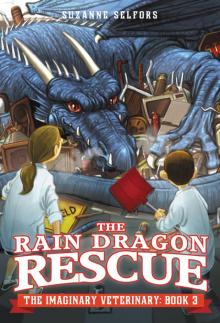 The Rain Dragon Rescue
The Rain Dragon Rescue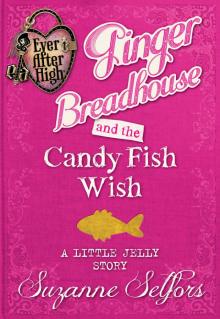 Ginger Breadhouse and the Candy Fish Wish
Ginger Breadhouse and the Candy Fish Wish Ever After High: Lizzie Hearts and the Hedgehog’s Hexcellent Adventure: A Little Shuffle Story
Ever After High: Lizzie Hearts and the Hedgehog’s Hexcellent Adventure: A Little Shuffle Story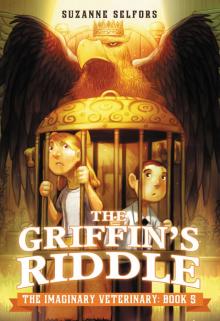 The Griffin's Riddle
The Griffin's Riddle Smells Like Pirates
Smells Like Pirates Duchess Swan and the Next Top Bird
Duchess Swan and the Next Top Bird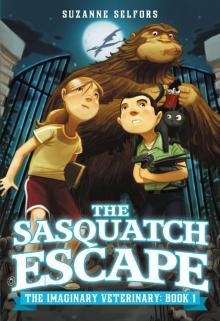 The Sasquatch Escape
The Sasquatch Escape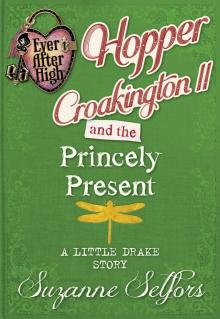 Hopper Croakington II and the Princely Present
Hopper Croakington II and the Princely Present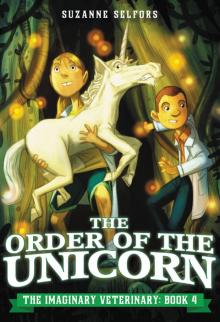 The Order of the Unicorn
The Order of the Unicorn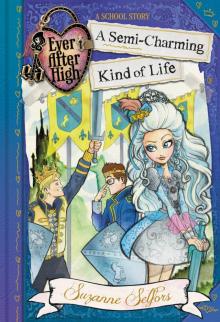 A Semi-Charming Kind of Life
A Semi-Charming Kind of Life Braver
Braver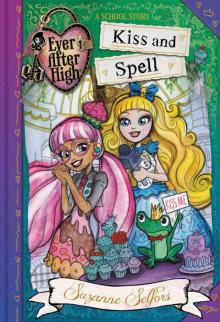 Kiss and Spell
Kiss and Spell Wedgie & Gizmo
Wedgie & Gizmo To Catch a Mermaid
To Catch a Mermaid Dexter Charming and the Trouble with Jackalopes
Dexter Charming and the Trouble with Jackalopes The Sweetest Spell
The Sweetest Spell CoffeeHouse Angel
CoffeeHouse Angel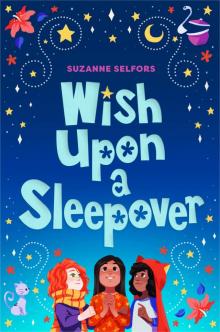 Wish Upon a Sleepover
Wish Upon a Sleepover Smells Like Dog
Smells Like Dog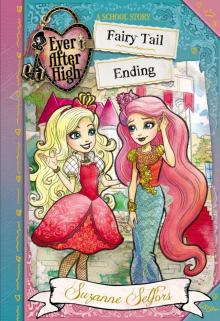 Ever After High
Ever After High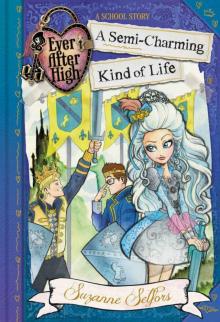 Ever After High: A Semi-Charming Kind of Life
Ever After High: A Semi-Charming Kind of Life Saving Juliet
Saving Juliet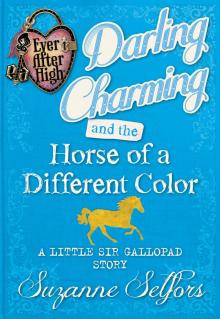 Darling Charming and the Horse of a Different Color
Darling Charming and the Horse of a Different Color Wedgie & Gizmo vs. the Toof
Wedgie & Gizmo vs. the Toof Spirit Riding Free--The Adventure Begins
Spirit Riding Free--The Adventure Begins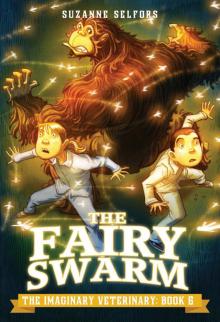 The Fairy Swarm
The Fairy Swarm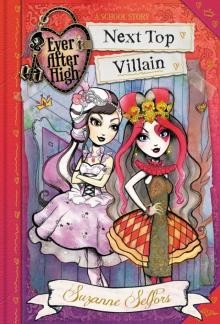 Ever After High: Next Top Villain: A School Story
Ever After High: Next Top Villain: A School Story Fortune's Magic Farm
Fortune's Magic Farm The Lonely Lake Monster
The Lonely Lake Monster Spirit Riding Free--Lucky and the Mustangs of Miradero
Spirit Riding Free--Lucky and the Mustangs of Miradero Smells Like Treasure
Smells Like Treasure Mad Love
Mad Love